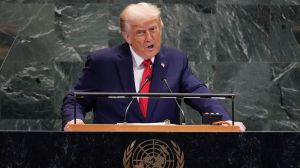EU threatens to boycott US climate talks
European nations on Thursday threatened to boycott US-led climate talks next month unless Washington...

European nations on Thursday threatened to boycott US-led climate talks next month unless Washington accepts a range of numbers for negotiating deep reductions of global-warming emissions at a UN conference here.
The move raised the stakes as delegates from nearly 190 nations entered final-hour talks on Bali aimed at launching negotiations for a successor to the Kyoto Protocol.
The US, Japan and several other governments refuse to accept language in a draft document suggesting that industrialised nations consider cutting emissions by 25 per cent to 40 per cent by 2020, saying specific targets would limit the scope of future talks.
The EU and others say the figures reflect the measures that needed to rein in global warming and head off predictions of rising sea levels, worsening floods and droughts, and the extinction of plant and animal species.
“No result in Bali means no Major Economies Meeting,” said Sigmar Gabriel, top EU environment official from Germany, referring to a series of separate climate talks initiated by President Bush in September. “This is the clear position of the EU. I do not know what we should talk about if there is no target.”
The US invited 16 other major economies, including European countries, Japan, China and India, to discuss a programme of what are expected to be voluntary cutbacks in greenhouse gas emissions.
The Bush administration views the major economies process as the main vehicle for determining future steps by the US — and it hopes by others — to slow emissions. But environmentalists accuse the US of trying to undermine the UN process.
UN climate chief Yvo de Boer said he was worried the US-EU deadlock could derail the process and that a final “Bali roadmap” would contain an agreement to negotiate a new climate deal by 2009, but may not include specific targets for emission reductions.
“I’m very concerned about the pace of things,” he said. “If we don’t get wording on the future, then the whole house of cards falls to pieces.”
The US delegation said while it continues to reject inclusion of specific emission cut targets, it hopes to reach an agreement that is “environmentally effective” and “economically sustainable”.
But haggling over numbers now was counterproductive, said Jim Connaughton, the chairman of the White House Council on Environmental Quality.
The US is the world’s largest emitter of greenhouse gases and the only major industrial country to have rejected Kyoto, which expires in 2012.
Pressure has come even from a one-time ally on climate, Australia, whose new Prime Minister urged Washington to “embrace” binding targets, and from former US vice-president Al Gore.
But US Under Secretary of State Paula Dobriansky, the head of the American delegation, told reporters that the conference was simply the start of negotiations, not the end.
Photos



- 01
- 02
- 03
- 04
- 05




























